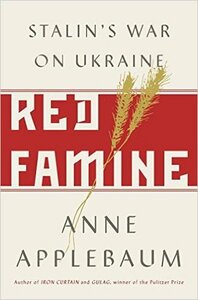You need to sign in or sign up before continuing.
Take a photo of a barcode or cover
Very interested in this after my trip to Ukraine, but skeptical after finding two major factual errors about the Caucasus (my region of expertise, which any expert on history of the region should have a basic grasp of), so we'll see how it pans out.
Starting at Chapter 11 it was interesting, but before that was really not.
Starting at Chapter 11 it was interesting, but before that was really not.
"Red Famine: Stalin's War On Ukraine" is about a tragedy that was actually denied for years. It clearly explains the relationship and animosity between the two nations, as Russia considered Ukraine nothing but a province, the language nothing but a dialect, and the culture nonexistent. The author is visionary enough to have predicted invasion 5 years before it happened.
But the bulk of the book is about the devastating tragedy - yes, genocide - of the Ukrainian Famine of 1932-33.
It's mind-boggling that it could have happened like it did but the evidence is clear: Stalin allowed - and encouraged - the famine that killed around 4 million people in Ukraine, mainly to prevent nationalism from taking hold.
So much devastation, unnecessary deaths, and long-term effects. According to the book, girls born in 1933 averaged a lifespan of 8 years. Boys lived 5 years. More than a generation was lost when you consider the children never born.
Ukraine has suffered so long and so much to finally gain control of its own future - and Russia again attempted to take it away.
Absolutely worth reading to understand the news today and what might happen tomorrow.
But the bulk of the book is about the devastating tragedy - yes, genocide - of the Ukrainian Famine of 1932-33.
It's mind-boggling that it could have happened like it did but the evidence is clear: Stalin allowed - and encouraged - the famine that killed around 4 million people in Ukraine, mainly to prevent nationalism from taking hold.
So much devastation, unnecessary deaths, and long-term effects. According to the book, girls born in 1933 averaged a lifespan of 8 years. Boys lived 5 years. More than a generation was lost when you consider the children never born.
Ukraine has suffered so long and so much to finally gain control of its own future - and Russia again attempted to take it away.
Absolutely worth reading to understand the news today and what might happen tomorrow.
dark
informative
sad
This was an exceptionally good book about Ukraine in the 1920s to WWII and Soviet agricultural economics. What stands out is how sever the consequences were political blacklisting and economic warfare by the Soviet Union on the nation.
The book covers the time period from about late-stage Russian civil war, the first famine, the Ukrainizarion policies to appease people after the famine in Ukraine and the north Caucasus provinces, and finally the political blacklisting of Ukrainian leaders and starvation under Stalin.
There are some insights on how Stalin reacted to knowingly failed policies, the paranoia of Soviet leaders about Ukrainian nationalism and culture, and lots of examples of ethnic cleansing that affect todays politics, borders, and people.
Applebaum as usual has more exposition in the middle sections than is needed for anyone not writing a thesis on collectivism or agronomics. That can be annoying, but the thoroughness lets Applebaum make her points about why these systems hurt so many well.
The other problem with the book is that it’s hard to pick up and read. You’d need a working knowledge of the Bolsheviks and White counterparts, some knowledge of pre-Revolution Tsarist policies, and understanding of why WWI was fought and how paranoi affected people in the interwar period, and some idea about the regional politics within the Soviet Union and how Soviet institutions work, and basic economic knowledge.
So great book for people who want to read high-level research on significant historical issues that have massive implications currently, but not an easy book to pick up without a lot of contextual knowledge.
The book covers the time period from about late-stage Russian civil war, the first famine, the Ukrainizarion policies to appease people after the famine in Ukraine and the north Caucasus provinces, and finally the political blacklisting of Ukrainian leaders and starvation under Stalin.
There are some insights on how Stalin reacted to knowingly failed policies, the paranoia of Soviet leaders about Ukrainian nationalism and culture, and lots of examples of ethnic cleansing that affect todays politics, borders, and people.
Applebaum as usual has more exposition in the middle sections than is needed for anyone not writing a thesis on collectivism or agronomics. That can be annoying, but the thoroughness lets Applebaum make her points about why these systems hurt so many well.
The other problem with the book is that it’s hard to pick up and read. You’d need a working knowledge of the Bolsheviks and White counterparts, some knowledge of pre-Revolution Tsarist policies, and understanding of why WWI was fought and how paranoi affected people in the interwar period, and some idea about the regional politics within the Soviet Union and how Soviet institutions work, and basic economic knowledge.
So great book for people who want to read high-level research on significant historical issues that have massive implications currently, but not an easy book to pick up without a lot of contextual knowledge.
I really enjoyed this book and felt like it gave context to current events that I have been ignorant of until now.
Strap in. The factual events in this book actually happened and they are utterly horrific. If you require that your history books not upset your delicate sensibilities, then go watch the Food Network, where famines never happen and human hunger is never deployed as a political weapon.
One clear takeaway from Red Famine is that Russia (as Russia and as the USSR) repeatedly has attempted to subjugate Ukraine militarily and via famine. The great Holodomor of the early 1930s was not even the first man-made Ukrainian famine of the 20th century.
Stalin's violence in Ukraine is the direct precedent for Putin's current-day abuses in the same geography, and the underlying political narratives are largely the same. If you wish to understand Putin's motivations, learn from Stalin.
For a relatively complete account of today's events in Ukraine, read this account of the Holodomor alongside:
_Bloodlands: Europe Between Hitler and Stalin_ by Timothy Snyder
_Not One Inch: America, Russia, and the Making of Post-Cold War Stalemate_, by Mary Elise Sarotte (deals with the legal agreement between post-Soviet Russia and newly-unbound Ukraine regarding territorial sovereignty and Ukranian nuclear missiles)
_Postwar: A History of Europe Since 1945_ by Tony Judt
_The Reconstruction of Nations: Poland, Ukraine, Lithuania, Belarus, 1669-1999_, also by Timothy Snyder
One clear takeaway from Red Famine is that Russia (as Russia and as the USSR) repeatedly has attempted to subjugate Ukraine militarily and via famine. The great Holodomor of the early 1930s was not even the first man-made Ukrainian famine of the 20th century.
Stalin's violence in Ukraine is the direct precedent for Putin's current-day abuses in the same geography, and the underlying political narratives are largely the same. If you wish to understand Putin's motivations, learn from Stalin.
For a relatively complete account of today's events in Ukraine, read this account of the Holodomor alongside:
_Bloodlands: Europe Between Hitler and Stalin_ by Timothy Snyder
_Not One Inch: America, Russia, and the Making of Post-Cold War Stalemate_, by Mary Elise Sarotte (deals with the legal agreement between post-Soviet Russia and newly-unbound Ukraine regarding territorial sovereignty and Ukranian nuclear missiles)
_Postwar: A History of Europe Since 1945_ by Tony Judt
_The Reconstruction of Nations: Poland, Ukraine, Lithuania, Belarus, 1669-1999_, also by Timothy Snyder
dark
informative
reflective
sad
dark
reflective
sad
tense
fast-paced
Finally got around with reading Red Famine after letting it linger on the shelf. The Holodomor reminds me so much of what is happening nowadays, a genocide. The usage of depravation of food.
You don't really feel Stalin's looming presence in the book that much unless that there is a part that it's directly about him. But as deeper the book goes, you can feel how the original Ukrainian revolutionaries' names fade away. I only realized that in the middle of the book.
In the end, with the genocide towards Palestinians, we can look back at the Holodomor. As we speak, another Holodomor against the Palestinians is happening. Such a shame that the author is pro-Israel.
You don't really feel Stalin's looming presence in the book that much unless that there is a part that it's directly about him. But as deeper the book goes, you can feel how the original Ukrainian revolutionaries' names fade away. I only realized that in the middle of the book.
In the end, with the genocide towards Palestinians, we can look back at the Holodomor. As we speak, another Holodomor against the Palestinians is happening. Such a shame that the author is pro-Israel.
This book is about more than the years of the famine, the Holodomor. It gives thorough information about the systematic attacks on Ukraine and its people under Stalin’s rule. It is dense with information despite decades of repression & denial of the facts it contains. This was written after the 2014 Russian attacks but before the current Russian aggression toward Ukraine.
I found it really interesting that the person who coined the term “genocide” said that it applied here. Unfortunately that has become political because the UN made it a legal term, and the Soviet Union was the member state to say the term didn’t apply to nations. I wonder why…
CWs: starvation, political oppression, cannibalism
I found it really interesting that the person who coined the term “genocide” said that it applied here. Unfortunately that has become political because the UN made it a legal term, and the Soviet Union was the member state to say the term didn’t apply to nations. I wonder why…
CWs: starvation, political oppression, cannibalism



